
Jefferson Airplane was an American rock band based in San Francisco, California, that became one of the pioneering bands of psychedelic rock. Formed in 1965, the group defined the San Francisco Sound and was the first from the Bay Area to achieve international commercial success. They headlined the Monterey Pop Festival (1967), Woodstock (1969), Altamont Free Concert (1969), and the first Isle of Wight Festival (1968) in England. Their 1967 breakout album Surrealistic Pillow was one of the most significant recordings of the Summer of Love. Two songs from that album, "Somebody to Love" and "White Rabbit", are among Rolling Stone's "500 Greatest Songs of All Time".

Jefferson Starship is an American rock band from San Francisco, California, formed in 1974 by a group of musicians including former members of Jefferson Airplane. Between 1974 and 1984, they released eight gold or platinum-selling studio albums, and one gold-selling compilation. The album Red Octopus went double-platinum, reaching No. 1 on the Billboard 200 chart in 1975. The band went through several major changes in personnel and genres through the years while retaining the Jefferson Starship name. The band name was retired in 1984, but it was picked up again in 1992 by a revival of the group led by Paul Kantner, which has continued since his death in 2016.

Martyn Jerel Buchwald, known as Marty Balin, was an American singer, songwriter, and musician best known as the founder/leader and one of the lead singers and songwriters of Jefferson Airplane and Jefferson Starship.
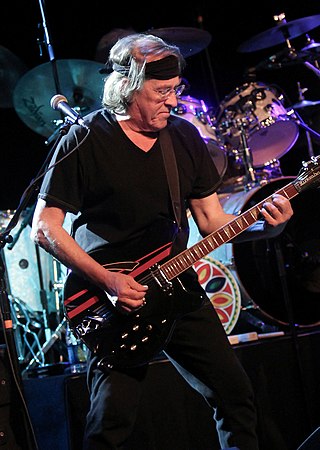
Paul Lorin Kantner was an American rock musician. He is best known as the co-founder, rhythm guitarist, and a secondary vocalist of Jefferson Airplane, a leading psychedelic rock band of the counterculture era. He continued these roles as a member of Jefferson Starship, Jefferson Airplane's successor band.

"White Rabbit" is a song written by Grace Slick and recorded by the American rock band Jefferson Airplane for their 1967 album Surrealistic Pillow. It draws on imagery from Lewis Carroll's 1865 book Alice's Adventures in Wonderland and its 1871 sequel Through the Looking-Glass.

Red Octopus is the second album by American rock band Jefferson Starship, released on Grunt Records in 1975. Certified double platinum by RIAA in 1995, it is the best-selling album by any incarnation of Jefferson Airplane and its spin-off groups. The single "Miracles" was the highest-charting single any permutation of the band had until Starship's "We Built This City" a decade later, ultimately peaking at No. 3 on the Billboard singles chart; the album itself reached No. 1 for four non-consecutive weeks on the Billboard 200. As was common in the era, stereo and quadraphonic mixes of the album were released concurrently.
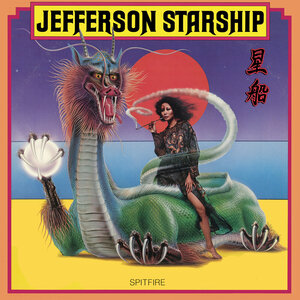
Spitfire is the third album by American rock band Jefferson Starship. Released in 1976, a year after the chart-topping Red Octopus, it quickly scaled the charts, peaking for six consecutive weeks at No. 3 in Billboard and attaining a RIAA platinum certification. The album features writing contributions from members of singer Marty Balin's former band Bodacious DF, as well as Jesse Barish, who became one of Balin's frequent collaborators. Stereo and quadraphonic mixes of the album were released. "Song to the Sun" was included in the 1977 Laserock program.
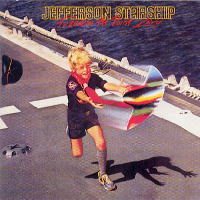
Freedom at Point Zero is the fifth album by American rock band Jefferson Starship, released in 1979. It was the first album for new lead singer Mickey Thomas, and the first after both Grace Slick and Marty Balin left the previous year. Aynsley Dunbar plays drums on this album; he had left Journey the previous year. The album cover was shot on location in the San Francisco Bay on board the USCGC Midgett.
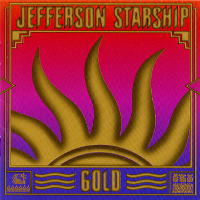
Gold is a compilation album by American rock band Jefferson Starship, released on Grunt Records in 1979. It collects the band's four Top 40 hit singles from the 1970s, as well as three additional singles that charted on the Billboard Hot 100, a single that missed the chart, one b-side, and one album track. All tracks were also featured on their four studio albums to date: Dragon Fly from 1974; Red Octopus from 1975; Spitfire from 1976; and Earth from 1978. It peaked at No. 20 on the Billboard 200, and has been certified a gold record by the RIAA.

Earth is the fourth album by American rock band Jefferson Starship. The album was recorded in 1977, with the same band lineup as the previous album, Spitfire and released in 1978.

Balince is a compilation album of Marty Balin's work, including work from his solo albums and also including tracks from Jefferson Airplane, Jefferson Starship, and KBC Band. The album also includes unreleased tracks from the KBC Band sessions. The album was released shortly after the Jefferson Airplane reunion album and tour.

Marty Balin Greatest Hits is Marty Balin's 1999 album. The first half of the album contains all-new recordings of songs that Marty had previously performed with Jefferson Airplane, Jefferson Starship, KBC Band, and during his solo career. The second half of the album contains interviews with Balin about various subjects.

Bodacious DF is a 1973 rock album, the only release by the short-lived band of the same name.

David Freiberg is an American musician best known for contributing vocals, keyboards, electric bass, rhythm guitar, viola and percussion as a member of Quicksilver Messenger Service, Jefferson Airplane, and Jefferson Starship. Among other tracks, he co-wrote "Jane", a hit for Jefferson Starship.

"Miracles" is a song written by Marty Balin and originally recorded by Jefferson Starship, appearing on its 1975 album Red Octopus.

"With Your Love" is a song written by Marty Balin, Joey Covington and Vic Smith. The song was first recorded by Jefferson Starship and was the lead single of their 1976 album Spitfire. In the US, the single peaked at number 12 on the Billboard Hot 100 and number 6 on the Adult Contemporary chart. It was also a top-ten hit in Canada.
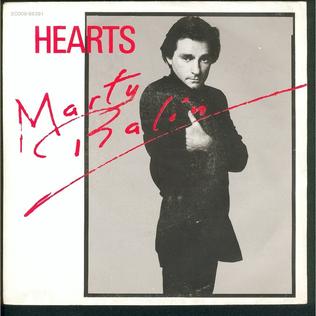
"Hearts" is a song written by Jesse Barish and performed by Marty Balin in 1981, included on his debut solo album Balin. It was Balin's third single in nineteen years and the biggest hit of his solo career.

"Runaway" is a 1978 song and single by Jefferson Starship, written by Nicholas Q. Dewey for the album Earth. It was the second U.S. Top 40 hit from that album, and was the follow-up to the Top 10 hit "Count On Me". The song peaked at #12 on the U.S. Billboard Hot 100 and number 13 on the Cash Box Top 100.
Jesse Barish is a musician and composer, most notable for writing the song "Count on Me" for Jefferson Starship; and several songs for Marty Balin, the former lead vocalist of Jefferson Starship, including: "Hearts", "Atlanta Lady ", and "Do It for Love".



















